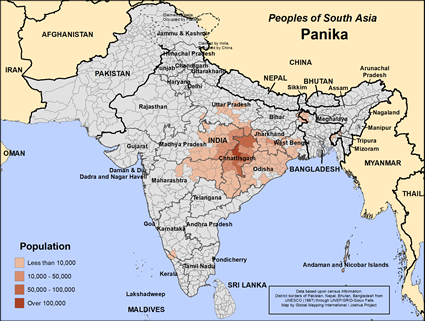Panika in India

Photo Source:
Anonymous
|

Map Source:
People Group data: Omid. Map geography: UNESCO / GMI. Map Design: Joshua Project.
|
| People Name: | Panika |
| Country: | India |
| 10/40 Window: | Yes |
| Population: | 1,071,000 |
| World Population: | 1,071,000 |
| Primary Language: | Chhattisgarhi |
| Primary Religion: | Hinduism |
| Christian Adherents: | 0.04 % |
| Evangelicals: | 0.00 % |
| Scripture: | Complete Bible |
| Ministry Resources: | Yes |
| Jesus Film: | Yes |
| Audio Recordings: | Yes |
| People Cluster: | South Asia Tribal - other |
| Affinity Bloc: | South Asian Peoples |
| Progress Level: |
|
Introduction / History
Very little is known about the origin of the Panika. Although some sources say that the Panika are of Dravidian origin, others simply refer to them as unclassified. The Panika live primarily in the Shahdol district. The Panika live mainly in the states of Chhattisgarh, Madhya Pradesh, Odisha and West Bengal. Their primary language is Chhattisgarhi.
The Panika tribe is divided into two broad groups: the Kabirpanthi (the largest group) and the Sakta. The Kabirpanthi follow the teachings of a man named Saint Kabir. They avoid liquor, meat and other "unclean" practices; therefore, they consider themselves purer and more advanced than the Sakta. The Sakta, who are addicted to liquor and eat meat freely, are more tribal in nature.
What Are Their Lives Like?
The Maikal Mountains consist of flat-topped plateaus that reach elevations of 2000 to 3000 feet. Eight different rivers have carved extensive basins in the soft rock formations of these mountains, and this is where the Panika have settled.
The Kabirpanthi Panika have farmed the fertile river basin area for years. Their principal crops include rice, wheat, chick-peas, sorghum, corn, sesame and mustard seeds. As a whole, their society is prosperous and most of their children attend school. Some of the people have vast fields, cattle, and several steers. Many are employed as village watchmen, forest guards, and teachers while others are excellent businessmen. Those who have moved to the city live in an agricultural market district, which is also a junction for railroads and an intersection of major roads. They buy goods from the rural Panika, which they stock and sell in the market at higher rates. They are also doing an increased amount of business with outsiders. The Kabirpanthi Panika are also known for their unique and beautiful weaving.
The Sakta Panika have been much more hesitant to settle on farms and begin raising cattle. They still rely heavily on hunting and gathering for survival. Their traditional trade of cloth weaving is gradually becoming obsolete due to the rapid production of mill-made cloth in their area. Yet, there is still a high demand for the colorful hand-made garments, so the Sakta continue to weave and trade their beautiful cloths.
The Panika live in multi-ethnic villages alongside the Gond, the Baiga, the Pardhi and other tribes. They are organized into a number of groups, which are mostly named after various plants and animals. There is a strict prohibition of marriage within the same group, and girls are usually married before they reach puberty.
What Are Their Beliefs?
Hinduism was introduced to the Panika in the twelfth century. The Sakta worship many village deities; whereas, the Kabirpanthi have their own sect which refrains from idols and caste distinctions.
The Kabirpanthi Panika are required to observe sanctity and purity in their daily lives and behavior. They believe that good behavior and meditation on the virtues of god are the methods of finding fulfillment. Those who are literate read their holy books, which contain the messages of Saint Kabir. Many illiterates are now learning to read and write because they have been so swayed by the teachings of Kabir.
The Kabirpanthi Panika wear small, beaded necklaces. During their religious ceremonies, they sing praise songs to the music of cymbals, and the guru (teacher) teaches morning and evening prayers.
What Are Their Needs?
The Panika are almost entirely unevangelized. Who will make the effort to live among them and show them the way to the cross?
Prayer Points
Ask the Lord of the harvest to send loving laborers to work among the Panika.
Ask God to encourage the small number of Panika believers to disciple others to disciple even more people.
Ask the Lord to bring forth a multiplying Panika church.